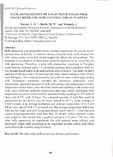| dc.contributor.author | Wangoh, J. | |
| dc.contributor.author | Okoth, M. W. | |
| dc.contributor.author | Wayua, F. O. | |
| dc.date.accessioned | 2014-07-22T07:23:07Z | |
| dc.date.available | 2014-07-22T07:23:07Z | |
| dc.date.issued | 2011-09 | |
| dc.identifier.citation | Optimimization of Agricultural Value Chains for sustainable Development | en_US |
| dc.identifier.uri | http://hdl.handle.net/11295/73228 | |
| dc.description | aGRO 2011 biennial conference presentation | en_US |
| dc.description.abstract | Milk marketing is an important income earning opportunity for people in arid
pastoral areas of Kenya. To minimise losses along the milk chain, traders boil
milk using scanty wood fuel which negatively affects the environment. The
abundant solar radiation in these areas could be explored for its suitability for
milk processing. Therefore, a solar milk pasteuriser consisting of flat-plate
water heating collector and a 1.5 mm thick stainless steel cylindrical milk vat
was designed and tested in an arid pastoral area of Kenya. The milk vat had a
capacity of80 litres and a 50 mm wide hot water jacket insulated with 38 mm
thick fibreglass. Hot water produced by the collector was used for pasteurising
milk. Parameters measured included the maximum achievable water
temperature, maximum amount of milk to be pasteurised, temperature of milk,
temperature of hot water, total bacterial count and coliform in the pasteurised
milk, solar radiation, ambient temperature and wind speed. Maximum milk
temperature inversely varied with the amount of milk, reaching 81.4 DC with 20
litres and 41.7DC with 70 litres. The optimum quantity of milk that could be
pasteurised by this device was 40 litres, heated to 69.TDC in an average of
1.3±0.1 hours, at an average insolation and ambient temperature of 22.5±0.9
Ml.mi.day" and 29.8±0.1 DC, respectively. The average temperature difference
between hot water and milk being pasteurised was 8.1±0.6DC. Total bacterial
counts in pasteurised milk were less than 10 cfu.ml' while coliform counts
were negative. The system had a payback period of 4.3 years. This low-cost
solar milk pasteuriser is appropriate for arid pastoral areas without grid
electricity, where milk marketing is an important income source, and where
most of the milk is boiled using firewood. | en_US |
| dc.description.sponsorship | National Council of Science and Technology, The Kenya Seed Company | en_US |
| dc.language.iso | en | en_US |
| dc.publisher | Faculty of Agriculture, University of Nairobi | en_US |
| dc.subject | performance | en_US |
| dc.subject | design, | en_US |
| dc.subject | Flat-plate solar milk pasteuriser, | en_US |
| dc.title | Development of a flat-plate solar milk pasteuriser for arid pastoral areas of Kenya | en_US |
| dc.type | Presentation | en_US |
| dc.type.material | en | en_US |

